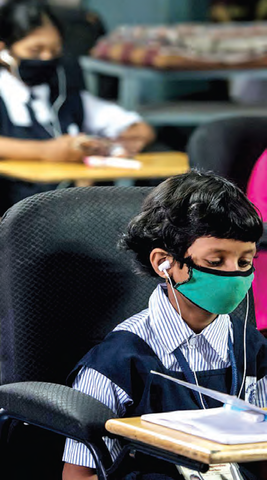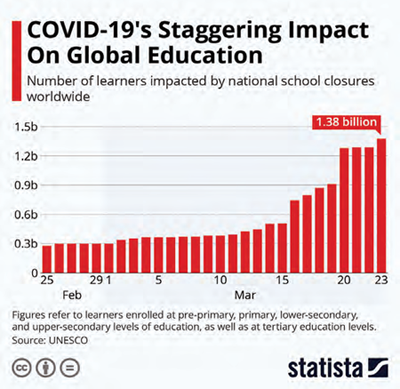This is how we make education fit for the post-Covid world

Due to pandemic-related learning losses, students currently in school are estimated to face a $10 trillion reduction in lifetime earnings.
Before the pandemic, it was estimated that by 2030, more than half of the world’s children and young people would not have the skills or qualifications necessary to participate in the emerging global workforce.
Forced to rethink how education works in the wake of Covid-19, education systems have an opportunity to reimagine learning and equip students with the cognitive, creative, social, emotional and physical skills required to navigate the future

Across the world, education systems’ responses to Covid-19 mean students are not re-entering the same classrooms they left earlier this year. It’s a daunting prospect, but also an opportunity to reimagine learning and modernise our education systems for the 21st century.
Global industries and operations have been shocked by the scale and pace of change in recent months, with education systems among those most affected. A record number of children and youth have been affected by schools closing because of Covid-19 and many may never return to education at all. We have witnessed educators and parents stepping up and embracing new learning environments and tools; and we’ve seen the power of both playful and engaging approaches to stimulate learning and skills development.
Teachers have created activity packs for families to use at home with children participating in #StoryCity challenges and harnessing their imaginations to build communities. Even virtual “playdates” between students have been organised by parents and teachers, giving learners opportunities to play with friends at a distance.
This learning crisis will undoubtedly worsen future job prospects. Before the pandemic, the Education Commission estimated that by 2030, more than half of the world’s children and young people (800 million) would not have the skills or qualifications necessary to participate in the emerging global workforce.
Today, approximately one-fifth of young people worldwide or 267 million, have already been affected by unemployment. In the future, they are also expected to earn less. Due to pandemic-related learning losses, students currently in school are estimated to face a $10 trillion reduction in lifetime earnings, equivalent to twice the global annual public expenditure on primary and secondary education. With 1.3 billion people entering adulthood in the next decade, it is critical that out-of-date approaches to education don’t serve as yet another barrier for tomorrow’s workers and leaders.
While traditional academic skills are important, we’ve also seen the role that playful, creative, and engaging experiences have in helping children cope in unpredictable and rapidly changing situations. Creativity and a child’s ability to be resilient despite life’s unpredictable challenges will be among the most in-demand skills that today’s learners need in a rapidly changing world. Research tells us that cognitive, creative, social, emotional and physical skills, when integrated with traditional academic skills, help develop students who can better navigate this complex world.
"We must not allow existing inequities to be exacerbated. As challenging as the pandemic is for education, it can be transformed into a watershed event to build more equitable and resilient education systems of the future"

Education systems around the world are urgently recalibrating, realising that they are dangerously outdated. Many are seizing the opportunity to modernise their systems for the 21st century reimagining learning to equip children with the skills they need to be productive, life-long learners. Even before the pandemic, there was an increasing appetite to move beyond intention to action, beyond pilots to scaling and beyond isolated examples to systemic reform.
A small number of pioneering nations are already ahead of the pack in efforts to enhance their learners’ creativity skills and do so at scale. Earlier this year, the LEGO Foundation released a report, Creating Systems-how can education systems reform enhance learners’ creativity skills?, which interviewed Australian, Japanese, Thai, Scottish and Welsh policymakers on their national and regional reform efforts. The report highlights inspiring efforts to reform curricula, assessment and teaching approaches. It also illustrates innovative programming with creative engagement on an unprecedented scale; positive changes in teaching and learning practice and greater levels of attainment and evidence of improved learner engagement, confidence and collaboration.
The report details 10 essential lessons for governments as they reset and reimagine learning. Political will, partnerships, shared language, evidence, lesson sharing and international engagement will all play huge roles in achieving significant and lasting reform.
Decisions in the coming weeks and months could prove pivotal in enabling or hindering a generation of young people-from securing meaningful employment to having the skills and knowledge they will need to solve the many future challenges our world will face. As millions of children are likely to remain without a stable physical classroom for the foreseeable future, we face the very real threat that virtual curricula will focus solely on literacy and numeracy rather than engaging, hands-on activities that help foster a breadth of essential skills.
We must not allow existing inequities to be exacerbated. As challenging as the pandemic is for education, it can be transformed into a watershed event to build more equitable and resilient education systems of the future. We can and we must reform our education systems and reimagine learning to equip all learners with the skills they need for the future.